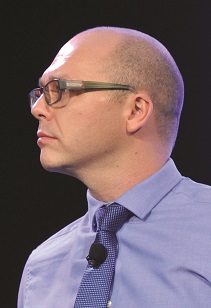Bullying unacceptable but not systematic, says HFMA
HFMA president Mark Orchard (pictured) said he was disturbed by reports from CIPFA claiming that NHS finance staff were feeling bullied by regulators to sign up to figures that they do not think are achievable.
He did not believe that bullying was organised, but added that NHS accountants must always give an honest assessment of the true financial position.
‘As a jobbing finance director for an acute hospital, I know all too well that a key part of my role is to deliver an honest and true assessment of the financial position, even when this is often not what anyone wants to hear. Integrity is central to our professional ethical code,’ he said.
A range of valid financial instruments, non-recurrent measures and short-term fixes were available to NHS organisations, he added. Unsubstantiated or unrealistic projections were unhelpful and postponed decisions that could be in the best interests of patients and the sustainability of services.
The HFMA has picked up individual comments from directors of finance and chief finance officers about expectations on delivering financial results.
Mr Orchard said some pressures went with the job, with most senior finance professionals under continuous pressure to confirm the deliverability of financial plans.
The level of pressure will vary between organisations, as will the maturity and experience of the board, he said in a blog published on the HFMA website. The job can be challenging even for the most resilient, but the chief financial officer role cannot be compromised. This role was outlined in a recently updated HFMA briefing, which is out for consultation.
‘Our job starts with telling it as it is – not worst case scenario or spreadsheet pessimism, and neither blind optimism with heroic assumptions.
‘We then need to create an environment in which, working alongside our operational and clinical colleagues, we can facilitate the best possible plan – and then work towards delivering that plan step by step. Support from chief executives, boards and governing bodies is paramount.’
At last year’s HFMA conference, NHS Improvement chief executive Jim Mackey addressed the issue directly. Accountants were hard-wired to be cautious and were sometimes too negative, he said. A balance had to be struck.
However, he was clear that accountants should not sign up to any figures that made them uncomfortable. He said: ‘If anybody tells you to report an answer you don’t think is right and there is no resolution to that, come to the senior leaders. If you are feeling compromised and don’t feel you are getting anywhere I am happy to take a call from you personally.’
HFMA chief executive Mark Knight said the association had always been a support network for finance professionals. However, he recognised that the function was now under significant pressure to deliver in terms of service and financial targets while delivering new models of care. ‘We are now looking at more formal ways for the HFMA to support practitioners and for finance directors and senior finance managers to support each other,’ he said. Proposals will be announced soon.
Related content
We are excited to bring you a fun packed Eastern Branch Conference in 2025 over three days.
This event is for those that will benefit from an overview of costing in the NHS or those new to costing and will cover why we cost and the processes.